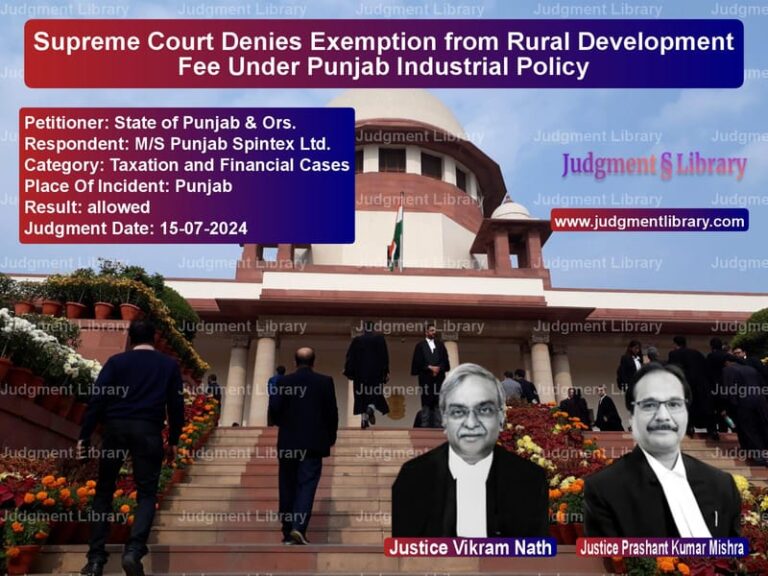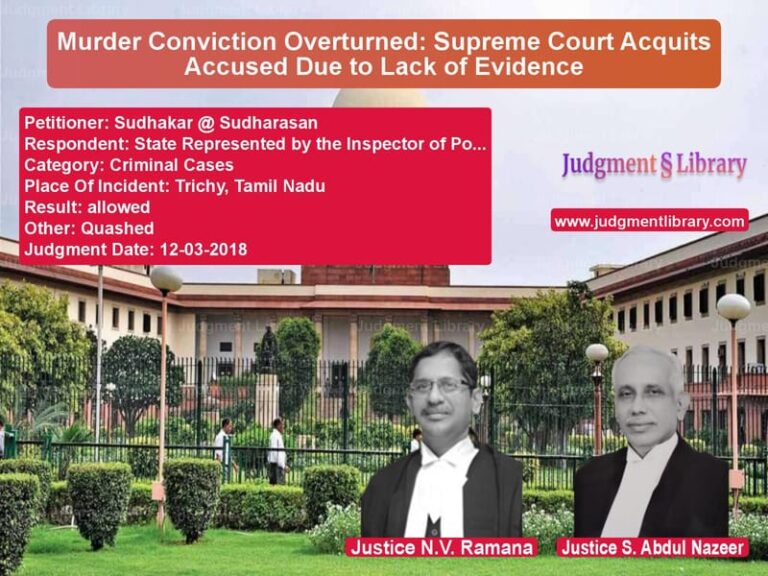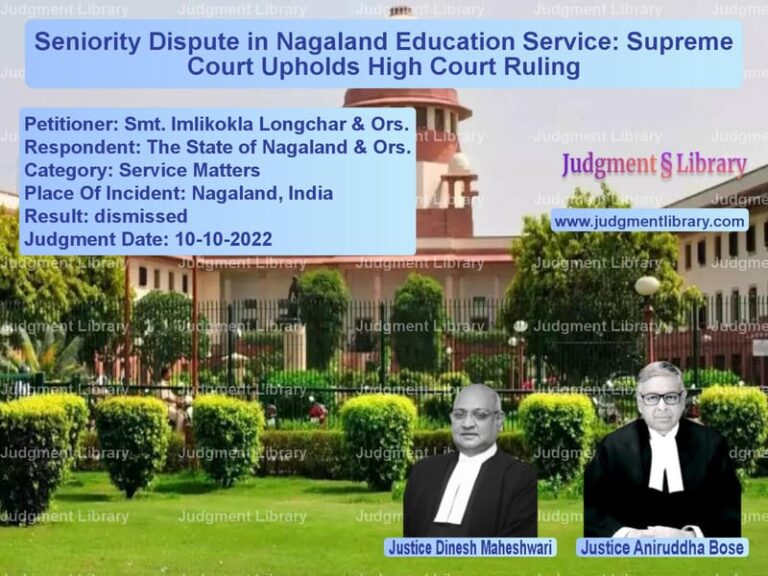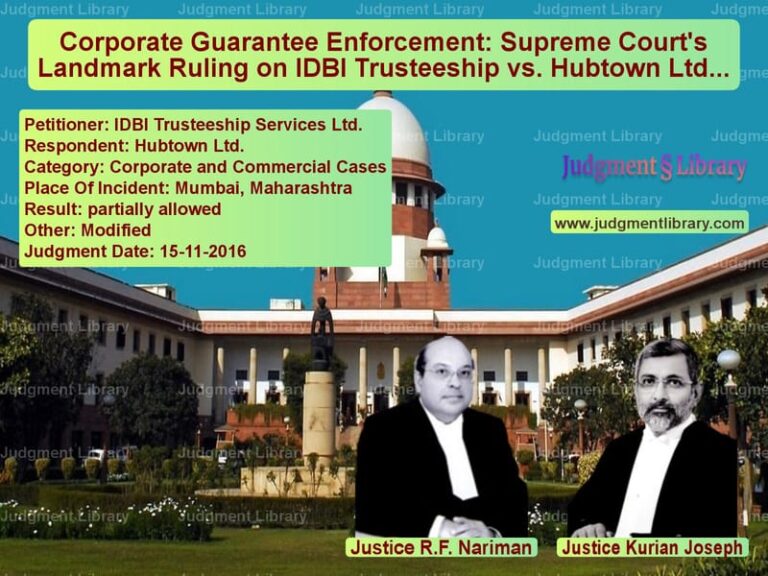SC Acquits Husband in Delhi Murder Case but Upholds Conviction for Dowry Death
The Supreme Court of India recently ruled on a long-pending criminal appeal concerning the alleged murder and dowry death of a woman in Delhi. The case, Ravinder Kumar vs. State of NCT of Delhi, revolved around the suspicious death of Meena, the wife of the appellant, who was found with her throat slit in her matrimonial home. The trial court and the High Court convicted Ravinder Kumar for both murder and dowry death. However, the Supreme Court, after examining the evidence, overturned the murder conviction while upholding the dowry-related offenses.
Background of the Case
The case dates back to May 29, 2004, when Meena was found dead at her matrimonial home. The circumstances were highly suspicious:
- Her throat had been slit with a sharp weapon.
- Her three-year-old son was found near her body.
- Meena’s parents alleged that she was subjected to harassment and cruelty for dowry.
Prior to her death, Meena had filed an FIR in 2001 under Section 498A IPC (cruelty by husband and relatives), accusing her husband and in-laws of physical and mental harassment. However, this case was later withdrawn after a compromise.
Legal Charges
The accused, Ravinder Kumar, was charged with the following offenses:
- Section 302 IPC (Murder): The prosecution claimed he murdered his wife.
- Section 304B IPC (Dowry Death): Meena had allegedly faced cruelty for dowry demands before her suspicious death.
- Section 498A IPC (Cruelty by Husband and Relatives): Evidence suggested that Meena was harassed for dowry.
Trial Court and High Court Verdicts
The trial court convicted Ravinder Kumar under Sections 302, 304B, and 498A IPC, sentencing him to:
- Life imprisonment for murder.
- Ten years’ imprisonment for dowry death.
- Three years’ imprisonment for cruelty under Section 498A.
The Delhi High Court upheld this conviction, dismissing Ravinder Kumar’s appeal.
Supreme Court’s Observations
The Supreme Court examined the case in detail, focusing on circumstantial evidence and inconsistencies in the prosecution’s claims.
1. Circumstantial Evidence for Murder Not Conclusive
The Court noted that the case was based entirely on circumstantial evidence. Referring to the landmark case of Sharad Birdhichand Sarda v. State of Maharashtra, the Court reiterated:
“Suspicion, however strong, cannot take the place of proof beyond reasonable doubt.”
The Court found gaps in the prosecution’s chain of evidence:
- The prosecution failed to establish that Ravinder Kumar was at home when the crime occurred.
- There were no direct witnesses linking him to the murder.
- Recovery of bloodstained clothes from his home was unreliable, as the site was accessible to others.
2. Conviction Under Section 304B IPC Upheld
Despite acquitting the accused of murder, the Supreme Court upheld his conviction for dowry death under Section 304B IPC. The Court observed:
“There is sufficient evidence to prove that Meena was subjected to cruelty related to dowry before her death.”
The Court cited statements from Meena’s parents and past police complaints to conclude that:
- There was a history of dowry-related harassment.
- Meena had previously filed an FIR but later withdrew it due to pressure.
- The timing of her death—within seven years of marriage—triggered the legal presumption under Section 304B IPC.
3. Sentencing Considerations
The Supreme Court noted that Ravinder Kumar had already spent 15 years in prison. Since the maximum punishment under Section 304B IPC is 10 years, the Court ruled:
“As the appellant has already undergone more than 15 years of incarceration, he is ordered to be released forthwith, unless required in any other case.”
Final Verdict
- Murder conviction under Section 302 IPC – Overturned
- Dowry death conviction under Section 304B IPC – Upheld
- Cruelty conviction under Section 498A IPC – Upheld
- Ravinder Kumar released after already serving over 15 years.
Key Takeaways
- Convictions must be based on conclusive proof: The Supreme Court reiterated that circumstantial evidence must be beyond reasonable doubt.
- Dowry-related offenses are taken seriously: Even if a direct link to murder is not established, harassment for dowry can lead to conviction under Section 304B IPC.
- Presumption under Section 304B IPC: If a woman dies under suspicious circumstances within seven years of marriage, and there is evidence of dowry-related cruelty, the husband and in-laws can be held responsible.
- Judicial scrutiny of prolonged incarceration: The Court considered the length of the appellant’s imprisonment while deciding the sentence.
This judgment underscores the importance of solid evidence in murder trials while reinforcing India’s strict stance on dowry-related crimes.
Petitioner Name: Ravinder Kumar.Respondent Name: State of NCT of Delhi.Judgment By: Justice B.R. Gavai, Justice Sandeep Mehta.Place Of Incident: Delhi.Judgment Date: 06-03-2024.
Don’t miss out on the full details! Download the complete judgment in PDF format below and gain valuable insights instantly!
Download Judgment: ravinder-kumar-vs-state-of-nct-of-delh-supreme-court-of-india-judgment-dated-06-03-2024.pdf
Directly Download Judgment: Directly download this Judgment
See all petitions in Murder Cases
See all petitions in Dowry Cases
See all petitions in Judgment by B R Gavai
See all petitions in Judgment by Sandeep Mehta
See all petitions in partially allowed
See all petitions in Modified
See all petitions in supreme court of India judgments March 2024
See all petitions in 2024 judgments
See all posts in Criminal Cases Category
See all allowed petitions in Criminal Cases Category
See all Dismissed petitions in Criminal Cases Category
See all partially allowed petitions in Criminal Cases Category







